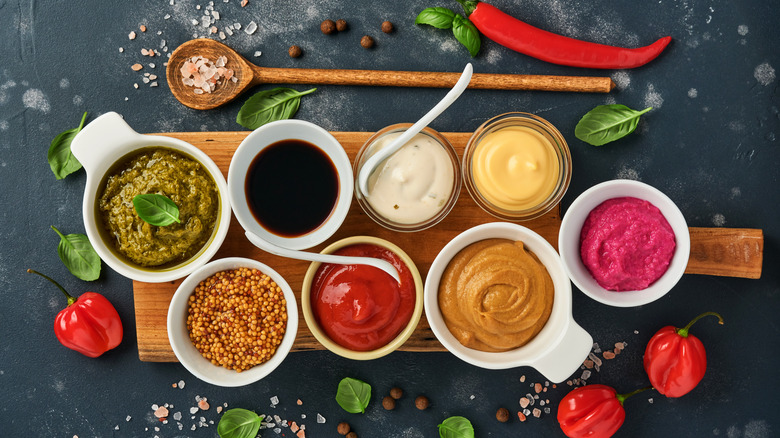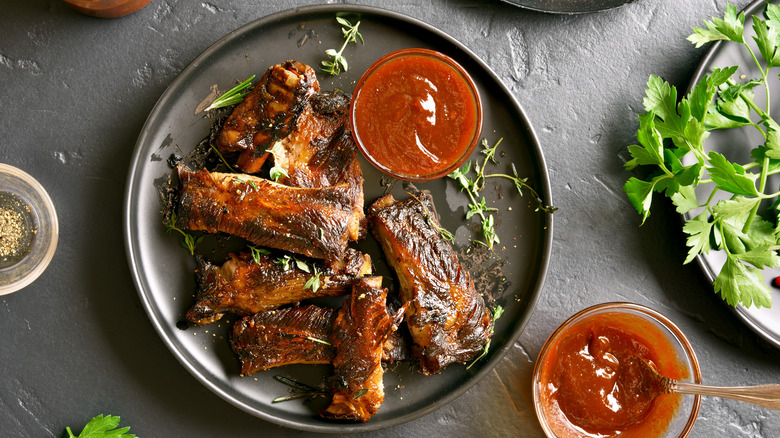Popular Condiments That Will Make You Gain Weight
Do you like your food spicy? It's no secret that some herbs and spices can increase fat burning, suppress appetite, or lower blood sugar. For example, ginger has been shown to reduce body weight, waist-to-hip ratio, and fasting blood glucose, according to clinical research published in Critical Reviews in Food Science and Nutrition. What's more, it may improve insulin sensitivity and raise good cholesterol levels in overweight and obese people.
Another example is turmeric, a dietary source of curcumin. Curcumin has been shown to reduce body weight, body fat levels, and waist circumference in just 30 days, reports the journal European Review for Medical and Pharmacological Sciences. This compound increases the levels of adiponectin, a peptide secreted by fat cells, which in turn may reduce inflammation and facilitate weight loss, explains a 2013 review published in Biofactors.
Ginseng, cayenne pepper, mustard, cinnamon, and dandelions have similar benefits, making it easier to achieve a healthy weight. Mustard, for instance, can boost your metabolism by a whopping 25%, while dandelions promote satiety, according to the YMCA of Austin.
Spicy sauces and dressings, on the other hand, are a whole different story. You might want to think twice before reaching for an extra serving of certain condiments since they could make gain weight.
These condiments may be sabotaging your diet
Most condiments contain a mix of spices, herbs, and veggies, but they may also have sugar, white flour, molasses, fruit juice, and refined oil in their composition. Store-bought ketchup and tomato sauce, for instance, boast large amounts of sugar and can add inches to your waistline, says Cornell University. Mayonnaise, on the other hand, contains a lot of fat and sodium. One serving, or 2 tablespoons, provides 180 calories, 20 grams of fat, and about 7% of the maximum daily recommended sodium intake, according to MyFoodData.
Low-fat salad dressing isn't healthier either, as manufacturers may add sugar, dextrose, high-fructose corn syrup, and other extras to boost its flavor, resulting in empty calories. What's more, beta-carotene and other nutrients in vegetables are fat soluble, meaning that your body absorbs them better in the presence of lipids. Fat-free and low-fat salad dressings are low in lipids, which may affect nutrient absorption, explains Produce for Better Health Foundation.
Teriyaki sauce, barbecue sauce, and ranch dressing can sabotage your diet, too. These extras are usually loaded with sugar, fat, or salt — and the calories will add quickly. For example, ranch dressing delivers around 140 calories, 14 grams of fat, and 4 grams of carbs per serving (per MyFoodData). Barbecue sauce is lower in calories and fat, but you'll still get 14 grams of carbs per serving, depending on the ingredients used. Similarly, teriyaki sauce has around 50 calories and 10 grams of carbs per 2 tablespoons.
Try these healthy swaps for sauces and dressings
Just because you're on a diet doesn't mean you should give up flavor. While it's true that most sauces and dressings pack empty calories, there are healthier options available. For starters, get ready to put your culinary skills to use. The experts at Harvard T.H. Chan School of Public Health recommend making your own sauces, dips, and dressings, such as guacamole, mint vinaigrette, walnut pesto, or Greek skordalia, a sauce that goes well with fish and veggies.
Alternatively, try to recreate your favorite sauces by using healthier ingredients. If a recipe calls for sugar, use stevia or monk fruit extract instead. Stevia, a natural sweetener, is calorie-free and may help prevent obesity, reports a 2015 review published in Nutrition Today. Some studies also suggest that it may protect against diabetes, hypertension, cancer, and inflammation, but more research is needed to confirm these findings, says the University of Texas at El Paso.
Healthline suggests using pesto, salsa, tahini, or mustard to spice up your meals. Again, your best bet is to prepare them at home. Another good choice is apple cider vinegar, which may help prevent blood sugar spikes after a meal. Balsamic vinegar, lemon juice, and red hot sauce are great choices, too, offering both flavor and nutrition. For example, red hot sauce contains capsaicin, a substance in chili peppers. This compound increases fat oxidation and regulates appetite, making it easier to lose weight, according to 2017 evidence presented in Bioscience Reports.



